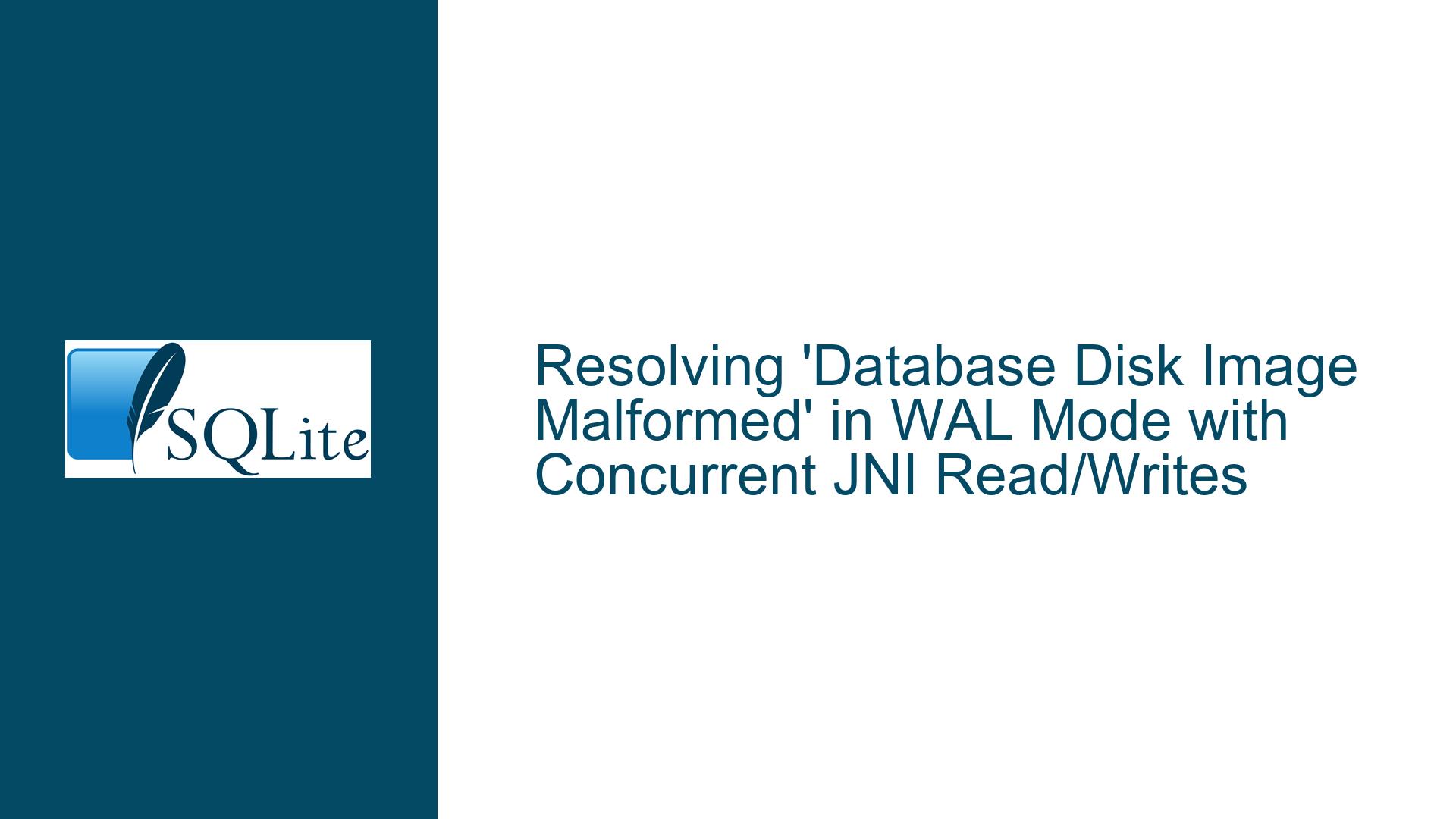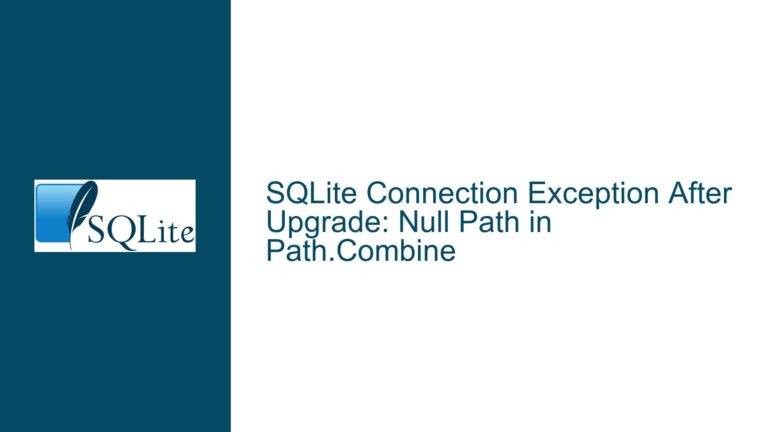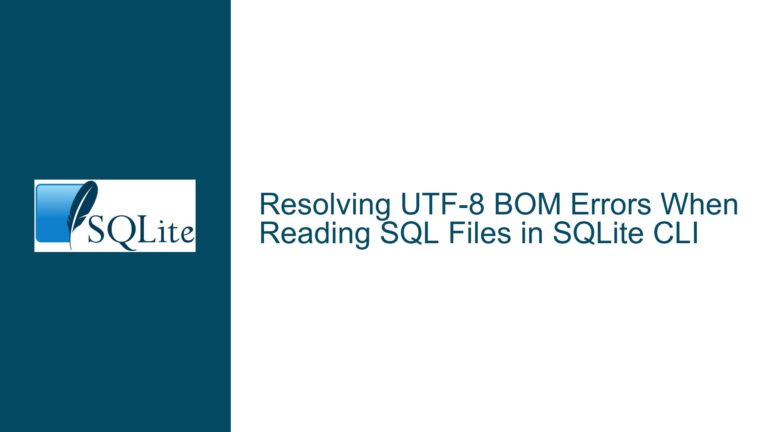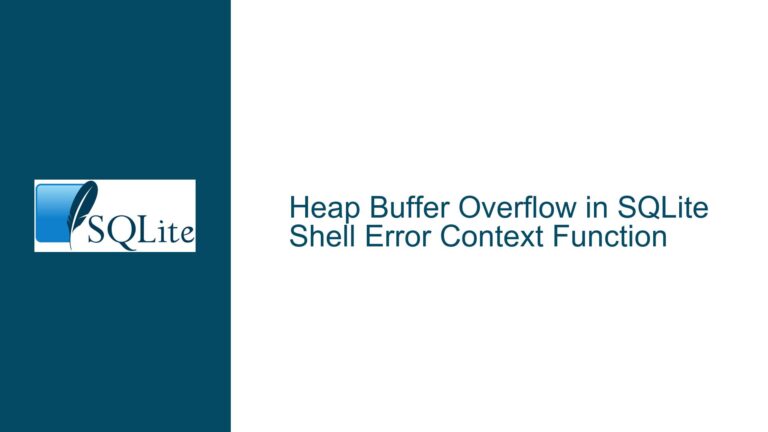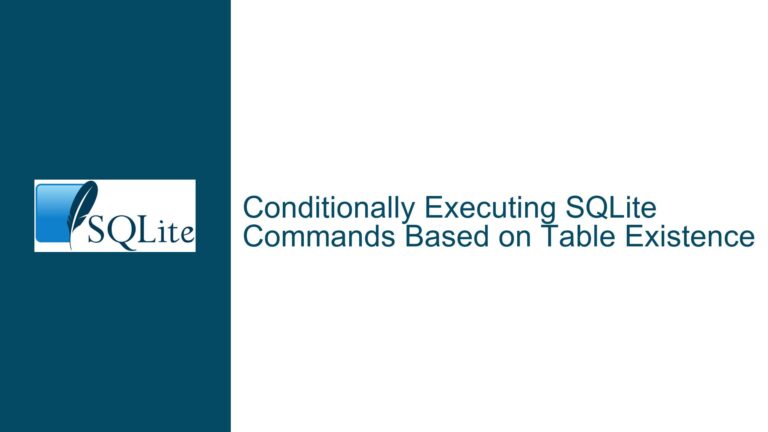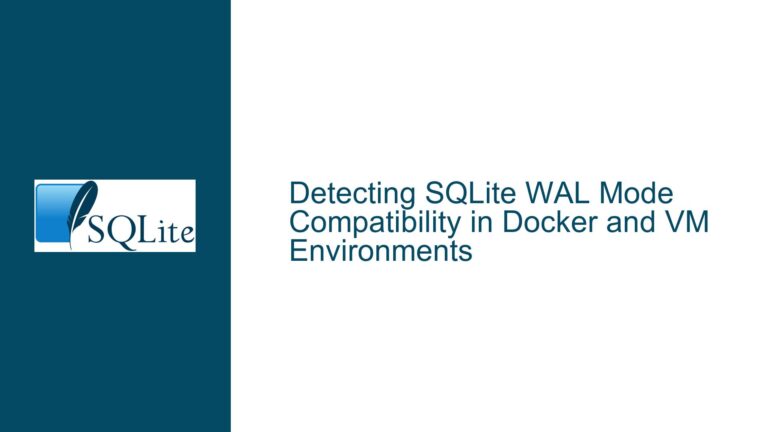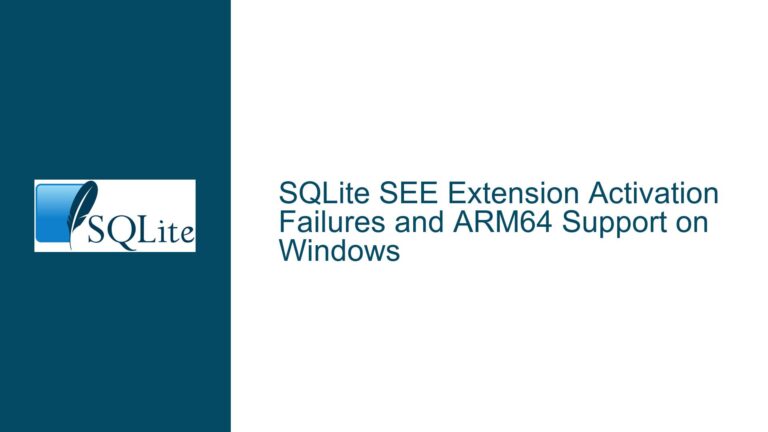Resolving ‘Database Disk Image Malformed’ in WAL Mode with Concurrent JNI Read/Writes
Concurrent Read/Write Conflicts in WAL Mode with Mixed Java-C++ JNI Access
1. WAL Mode Configuration & Cross-Language Resource Contention
The core issue revolves around a single-process application architecture where a Java-based writer thread and a C++-based reader thread (invoked via JNI) attempt concurrent access to an SQLite database configured in Write-Ahead Logging (WAL) mode. The writer uses the SQLiteJDBC driver with OPEN_READWRITE | OPEN_NOMUTEX, while the C++ reader employs SQLiteCpp with OPEN_READONLY | OPEN_NOMUTEX. The critical symptom is a transient database disk image is malformed error during read operations when both components operate within the same process. Crucially, the database remains valid when accessed externally or through homogeneous language bindings (e.g., Java-to-Java or C++-to-C++).
This error manifests exclusively under three conditions:
- The reader and writer share the same OS process.
- The reader is invoked via JNI from Java to C++.
- Both components use distinct SQLite library binaries (Java’s embedded native library vs. the system-wide C++ library).
The WAL mode’s design assumes that all database connections within a process coordinate through shared memory and mutexes managed by a single SQLite library instance. When multiple SQLite binaries are loaded into the same process (e.g., Java’s libsqlitejdbc.so and C++’s system libsqlite3.so), they operate in complete isolation. Each maintains independent WAL buffers, lock files, and shared memory regions. This fragmentation causes the writer and reader to perceive conflicting database states, triggering the malformed database error.
2. Root Causes of Library Isolation & WAL State Desynchronization
2A. Duplicate SQLite Library Instances in a Single Process
The Java SQLiteJDBC driver bundles its own SQLite native library (e.g., sqlite-jdbc-3.39.0.jar embeds libsqlitejdbc.so), which is extracted to a temporary directory at runtime. Meanwhile, the C++ component links against the system’s libsqlite3.so. Even if both libraries are version 3.39.0, they are compiled with different configurations or paths, causing the operating system to treat them as separate entities. Consequently:
- Each library initializes its own global mutexes and memory pools.
- WAL-index shared memory (
-shmfile) is mapped independently by each library. - File locks (via
fcntlorflock) are not honored between libraries, as they lack awareness of each other’s lock states.
When the Java writer updates the database, it modifies the WAL file and updates its private -shm mapping. The C++ reader, using a separate SQLite instance, reads stale WAL data or detects an invalid checksum due to uncoordinated updates, leading to the malformed error.
2B. Incorrect Mutex Configuration Across Language Boundaries
The OPEN_NOMUTEX flag in both connections instructs SQLite to disable internal mutexes, relying on the application to serialize access. However, this setting only applies within a single SQLite library instance. When two instances are active:
- The Java writer (using
OPEN_NOMUTEX) assumes it has exclusive write access, as its SQLite library’s mutexes are disabled. - The C++ reader (also
OPEN_NOMUTEX) bypasses mutexes within its own library but cannot synchronize with the Java-side library. - Concurrent file writes (WAL updates) and reads cause torn page writes or invalid WAL snapshots.
2C. Mismatched Memory Mapping (MMAP) Settings
The C++ reader sets PRAGMA mmap_size=30000000000, attempting to map the entire database into memory. However, if the Java writer’s SQLite instance uses a smaller default mmap_size, the two components access the database file through divergent memory mappings. WAL-mode relies on MMAP for efficient synchronization; inconsistent mappings lead to readers observing partial writes or corrupted page images.
3. Resolving Library Conflicts & Enforcing WAL Consistency
3.1. Unify SQLite Library Usage Across Java and C++
Step 1: Verify Library Duplication
Use ldd (Linux), otool -L (macOS), or Process Explorer (Windows) to confirm that the Java and C++ components load different SQLite libraries. For Java, inspect the temporary directory where SQLiteJDBC extracts its native library (e.g., /tmp/sqlite-*/libsqlitejdbc.so).
Step 2: Force Java to Use the System SQLite Library
Recompile the SQLiteJDBC driver to link against the system libsqlite3.so:
git clone https://github.com/xerial/sqlite-jdbc
cd sqlite-jdbc
# Edit Makefile to remove -DSQLITE_ENABLE_LOAD_EXTENSION and link to system lib
make
Replace the original JDBC JAR with the rebuilt version. This ensures both Java and C++ use the same library binary.
Step 3: Validate Shared Library Integrity
After unification, confirm that both components use identical library paths and checksums:
# Linux example
md5sum $(readlink -f /path/to/java/libsqlite.so) /usr/lib/libsqlite3.so
3.2. Configure Mutexes and Connection Modes Correctly
Step 4: Replace OPEN_NOMUTEX with FULLMUTEX in Writer
In the Java writer, use SQLiteOpenMode.FULLMUTEX to enable SQLite’s internal mutexes:
config.setOpenMode(SQLiteOpenMode.READWRITE | SQLiteOpenMode.FULLMUTEX);
This allows the SQLite library to manage cross-thread synchronization, essential when sharing the library between Java and C++.
Step 5: Enable Shared Cache Mode (If Applicable)
If the reader and writer must operate on separate threads with high concurrency, enable shared cache mode:
// Java
config.setSharedCache(true);
// C++
sqlite3_config(SQLITE_CONFIG_SERIALIZED);
sqlite3_enable_shared_cache(1);
Shared cache allows connections to share a single page cache and WAL state.
3.3. Align WAL and MMAP Settings Across Connections
Step 6: Standardize PRAGMA Configuration
Ensure both connections use identical mmap_size, journal_mode, and synchronous settings:
// Java writer
try (Connection conn = ...) {
conn.createStatement().execute("PRAGMA mmap_size=30000000000");
conn.createStatement().execute("PRAGMA synchronous=NORMAL");
}
// C++ reader
sqlite_db->exec("PRAGMA mmap_size=30000000000");
sqlite_db->exec("PRAGMA synchronous=NORMAL");
Step 7: Monitor WAL File State During Contention
Use strace/dtrace to trace file accesses during read/write operations:
strace -e trace=file -f -p <java_pid> 2>&1 | grep -E '(wal$|shm$)'
Check for overlapping writes to the -wal and -shm files. If the Java and C++ components access separate -shm files, it confirms library duplication.
3.4. Handle JNI Memory and File Descriptor Lifetime
Step 8: Ensure File Descriptors Are Shared
SQLite relies on file locking via fcntl or flock. If the Java and C++ libraries open the database file separately (different file descriptors), locks are not shared. Confirm that both components share the same file descriptor using /proc/<pid>/fd (Linux):
ls -l /proc/$(pgrep java)/fd | grep 'main.db'
If multiple entries exist, the libraries are opening the file independently.
Step 9: Explicitly Close Connections in JNI Code
Improper connection closure in C++ can leave stale file handles. Use RAII patterns in C++:
{
SQLite::Database db("main.db", SQLite::OPEN_READONLY);
// Perform reads
} // db closed automatically
3.5. Test with Homogeneous Connections
Step 10: Reproduce with Java-Only or C++-Only Workloads
Isolate the issue by replacing the JNI reader with a Java-native reader or a standalone C++ process. If the error disappears, the problem is specific to JNI/library interaction.
Final Solution Summary
- Mandatory: Unify the SQLite library across Java and C++ components.
- Recommended: Use
FULLMUTEXand shared cache mode for cross-thread coordination. - Optional: Standardize PRAGMA settings and monitor file descriptor sharing.
By ensuring a single SQLite library instance governs all database connections within the process, WAL mode’s concurrency mechanisms function correctly, eliminating the malformed database error.
